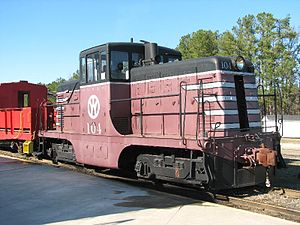GE 44-ton switcher

|
|||||||||||||||||||||||||
|
|||||||||||||||||||||||||
|
|||||||||||||||||||||||||
|
|||||||||||||||||||||||||
|
|||||||||||||||||||||||||
| Type and origin | |
|---|---|
| Power type | Diesel-electric |
| Builder | GE Transportation Systems |
| Model | 44-ton switcher |
| Build date | September 1940–October 1956 |
| Total produced | 386 |
| Specifications | |
|---|---|
| AAR wheel arr. | B-B |
| UIC class | Bo′Bo′ |
| Gauge | 4 ft 8 1⁄2 in (1,435 mm) standard gauge |
| Loco weight | 44 short tons (39 long tons; 40 t) |
| Prime mover |
Caterpillar D17000 (2 off) except: Hercules DFXD (2 off) 9 locomotives; Buda 6DH1742 (2 off) 10 locomotives; Caterpillar D342 (2 off) 4 locomotives. |
| RPM range | D17000: 1,000 (max) 6DH1742: 1,050 (max) DFXD: 1,600 (max) D342: 1,200 (max) |
| Engine type | D17000: V8 diesel All others: 6-cyl diesel |
| Aspiration | Naturally aspirated |
| Traction motors | Four |
| Cylinders | D17000: 8 All others: 6 |
| Cylinder size | D17000: 5.75 in × 8 in (146 mm × 203 mm) 6DH1742: 6.5 in × 8.375 in (165 mm × 213 mm) DFXD: 5.5 in × 6 in (139.700 mm × 152.400 mm) D342: 5.75 in × 8 in (146.050 mm × 203.200 mm) |
| Performance figures | |
|---|---|
| Power output | 360 to 400 hp (270 to 300 kW) |
| Career | |
|---|---|
| Locale | North America, Australia, Saudi Arabia, South America, India, France, Sweden . |
The GE 44-ton switcher is a 4-axle diesel-electric locomotive built by General Electric between 1940 and 1956. It was designed for industrial and light switching duties, often replacing steam locomotives that had previously been assigned these chores. This locomotive's specific 44-short ton weight was directly related to one of the efficiencies the new diesel locomotives offered compared to their steam counterparts: reduced labour intensity. In the 1940s, the steam to diesel transition was in its infancy in North America, and railroad unions were trying to protect the locomotive fireman jobs that were redundant with diesel units. One measure taken to this end was the 1937 so-called "90,000 Pound Rule" : a stipulation that locomotives weighing 90,000 pounds (41,000 kg) – 45 short tons – or more required a fireman in addition to an engineer on common carrier railroads. Industrial and military railroads had no such stipulation. The 44-ton locomotive was born to skirt this requirement. Other manufacturers also built 44-ton switchers of center-cab configuration. 276 examples of this locomotive were built for U. S. railroads and industrial concerns, four were exported to Australia in 1944, 10 were exported to Canada, 10 were exported to Cuba, one was exported to the Dominican Republic, five were exported to France, three were exported to India, six were exported to Mexico, five were exported to Saudi Arabia, one was exported to Sweden, two were exported to Trinidad, 10 were exported to Uruguay, and 57 were built for the U. S. Military. Many remain, in service and in museums.
The locomotives were available with a choice of prime movers. Most were built with a pair of Caterpillar's D17000 V8 180 horsepower (134 kW) engines, but three other engines types were used. Nine were built with a pair of Hercules DFXD engines, and were sold to Chattanooga Traction (2) and Missouri Pacific Railroad and its subsidiaries (7). Ten were built with a pair of the slightly more powerful Buda 6DH1742, rated at 200 horsepower (150 kW) each. The last four locomotives built had Caterpillar D342 engines, and were sold to Canadian National Railways (3) and the Dansville and Mount Morris Railroad (1).
...
Wikipedia
